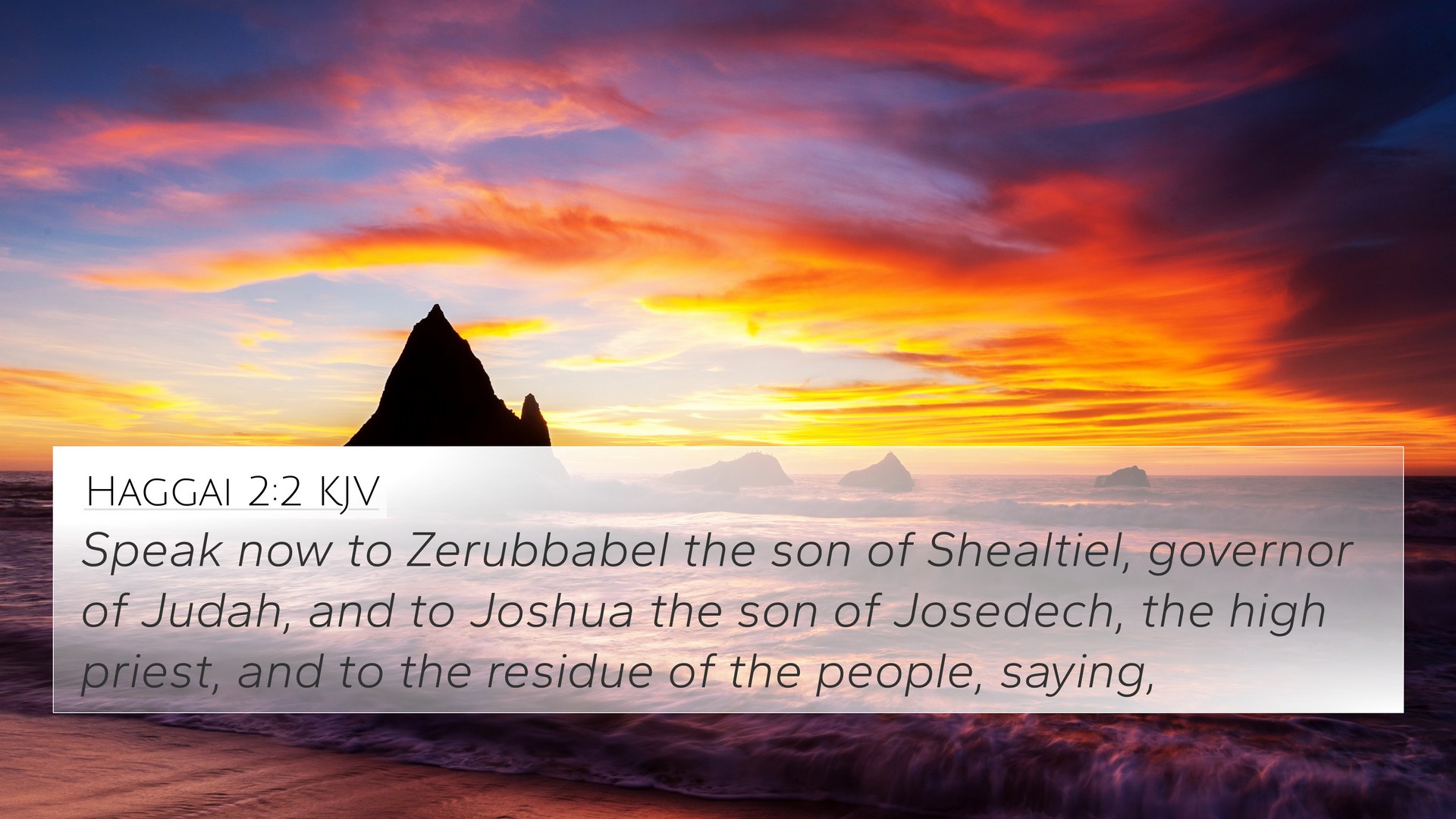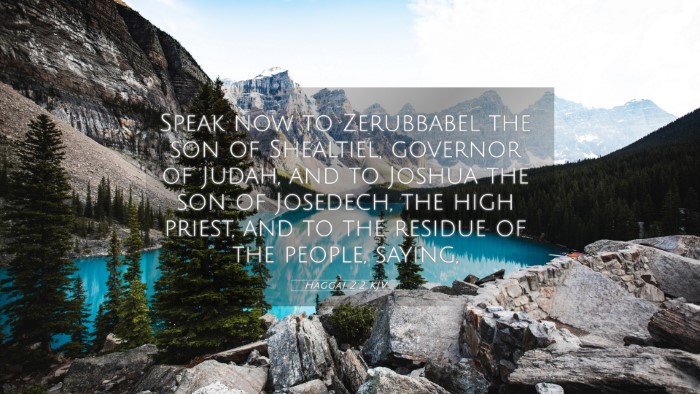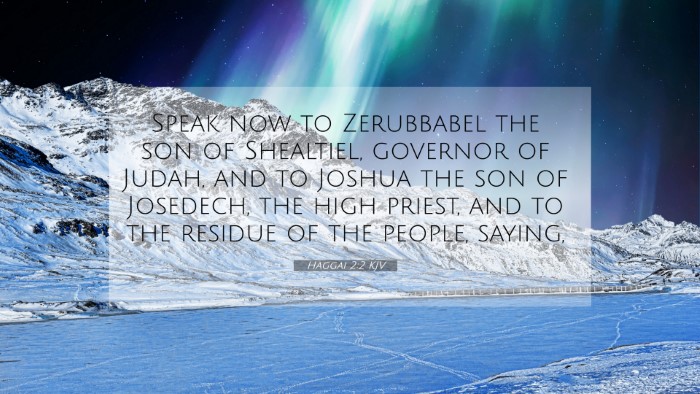Old Testament
Genesis Exodus Leviticus Numbers Deuteronomy Joshua Judges Ruth 1 Samuel 2 Samuel 1 Kings 2 Kings 1 Chronicles 2 Chronicles Ezra Nehemiah Esther Job Psalms Proverbs Ecclesiastes Song of Solomon Isaiah Jeremiah Lamentations Ezekiel Daniel Hosea Joel Amos Obadiah Jonah Micah Nahum Habakkuk Zephaniah Haggai Zechariah MalachiHaggai 2:2 Similar Verses
Haggai 2:2 Cross References
Speak now to Zerubbabel the son of Shealtiel, governor of Judah, and to Joshua the son of Josedech, the high priest, and to the residue of the people, saying,
Uncover the Rich Themes and Topics of This Bible Verse
Listed below are the Bible themes associated with Haggai 2:2. We invite you to explore each theme to gain deeper insights into the Scriptures.
Haggai 2:2 Cross Reference Verses
This section features a detailed cross-reference designed to enrich your understanding of the Scriptures. Below, you will find carefully selected verses that echo the themes and teachings related to Haggai 2:2 KJV. Click on any image to explore detailed analyses of related Bible verses and uncover deeper theological insights.
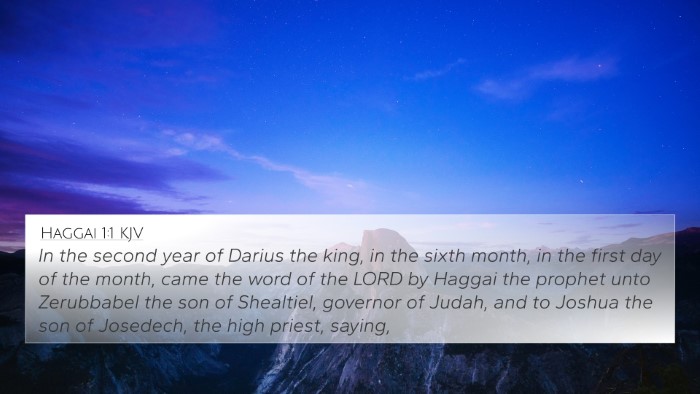
Haggai 1:1 (KJV) »
In the second year of Darius the king, in the sixth month, in the first day of the month, came the word of the LORD by Haggai the prophet unto Zerubbabel the son of Shealtiel, governor of Judah, and to Joshua the son of Josedech, the high priest, saying,
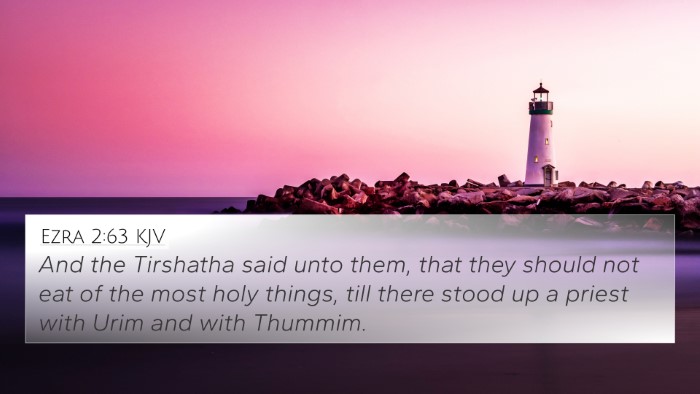
Ezra 2:63 (KJV) »
And the Tirshatha said unto them, that they should not eat of the most holy things, till there stood up a priest with Urim and with Thummim.
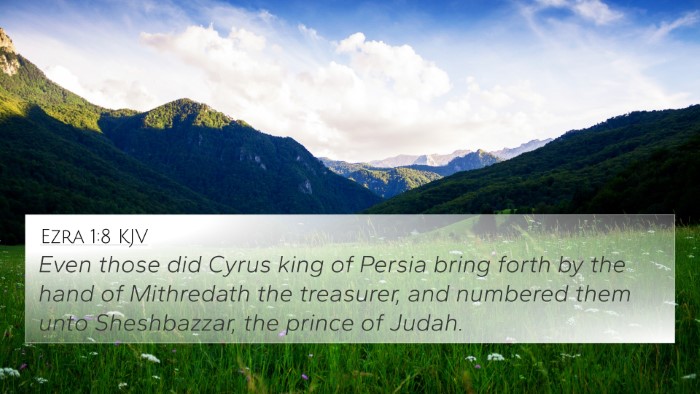
Ezra 1:8 (KJV) »
Even those did Cyrus king of Persia bring forth by the hand of Mithredath the treasurer, and numbered them unto Sheshbazzar, the prince of Judah.
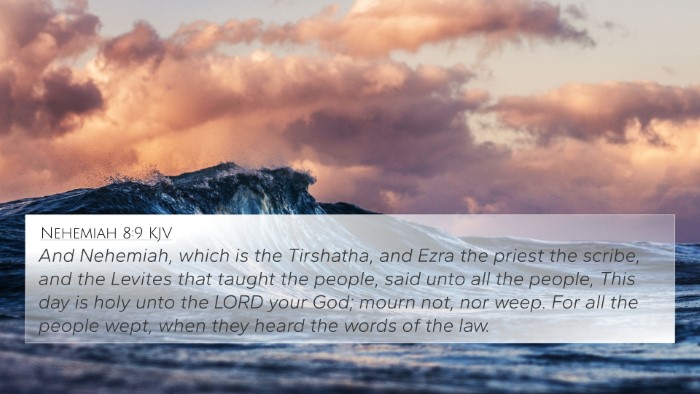
Nehemiah 8:9 (KJV) »
And Nehemiah, which is the Tirshatha, and Ezra the priest the scribe, and the Levites that taught the people, said unto all the people, This day is holy unto the LORD your God; mourn not, nor weep. For all the people wept, when they heard the words of the law.
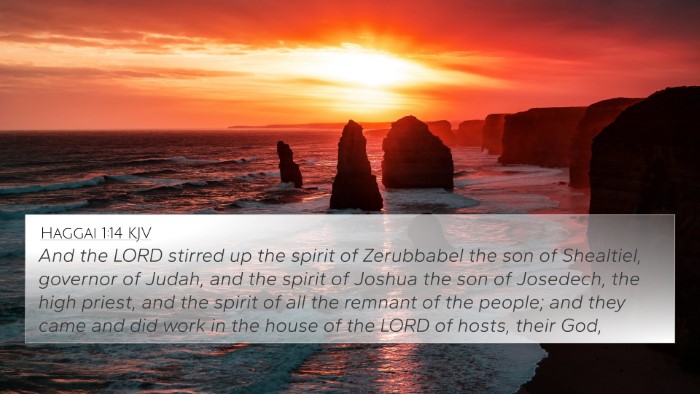
Haggai 1:14 (KJV) »
And the LORD stirred up the spirit of Zerubbabel the son of Shealtiel, governor of Judah, and the spirit of Joshua the son of Josedech, the high priest, and the spirit of all the remnant of the people; and they came and did work in the house of the LORD of hosts, their God,
Haggai 2:2 Verse Analysis and Similar Verses
Bible Verse: Haggai 2:2
Verse Text: "Speak now to Zerubbabel the son of Shealtiel, governor of Judah, and to Joshua the son of Jehozadak, the high priest, and to the remnant of the people, saying,"
Meaning and Interpretation
This verse is part of a call to the leaders and the returned exiles of Israel. It showcases God's communication through His prophets as He prepares the people for the rebuilding of the temple. Here’s a summary of insights based on comments from public domain commentaries:
- Context: The backdrop of Haggai's message is the post-exilic period when the people of Judah faced discouragement in rebuilding the temple after their return from Babylonian captivity.
- Significance of Leadership: Haggai addresses both Zerubbabel, a descendant of David and governor, and Joshua, the high priest. This highlights the importance of both civil and religious leadership in guiding the people towards God's plans.
- Call to Action: The phrase "speak now" indicates urgency in delivering the message, urging the leaders to rally the remnant of the people to action.
Insights from Commentaries
Matthew Henry: Henry emphasizes the encouragement that Haggai brings to the leadership, as the remnant was struggling with feelings of inadequacy and insignificance in the shadow of the previous temple's glory. Haggai serves to motivate and remind them of God’s promise and presence.
Albert Barnes: Barnes highlights the unity of purpose between Zerubbabel and Joshua. Their collaboration is essential for the restoration of the temple, and thus, they embody God's plan of restoration for Israel. He also notes the ‘remnant’ as a focal point, showcasing God's preservation of His people.
Adam Clarke: Clarke points out the significance of Haggai's message during a time of hardship. He interprets the "remnant" as not only a demographic but as a symbol of hope for a divine resurgence in Israel’s spiritual life, encouraging them to persevere despite their current struggles.
Cross-References
Haggai 2:2 connects with several other Bible verses that reflect similar themes or messages:
- Ezra 5:1-2: God’s command to the prophets during the rebuilding of the temple.
- Zechariah 4:6-7: Encouragement that the project will succeed, "Not by might, nor by power, but by my Spirit."
- Isaiah 40:1-2: A call for comfort and encouragement to God's people.
- Jeremiah 29:11: Assurance that God has plans for His people, fostering hope.
- Matthew 28:20: The promise of Jesus's presence with His followers, akin to God’s reminder to the people.
- 2 Corinthians 6:1: Appeal for the church to not receive God's grace in vain, reflecting God's ongoing work among His people.
- Hebrews 10:25: Exhortation for believers not to forsake the assembling together, important in community building.
- Revelation 3:13: An encouragement to hear what the Spirit says to the churches, resonating with the prophetic voice of Haggai.
- Nehemiah 2:17: Addressing the need to rebuild and encouraging the people’s efforts.
- Malachi 3:1: The messenger preparing the way, linking the prophetic tradition leading to the arrival of the Lord.
Connections Between Bible Verses
The connections among these verses show a consistent theme of divine encouragement, the importance of leadership, and the imperative for the community to respond in faith to God’s calling. Each verse serves to strengthen the understanding of Israel's identity, particularly after exile, and the promise of restoration and presence.
Cross-Referencing Biblical Texts
The study of these scriptures can enhance understanding of theological themes such as redemption, community, and divine guidance. Utilizing tools for Bible cross-referencing like a Bible concordance allows believers to deeper explore these connections, revealing the continuity of God’s purpose across scripture.
Thematic Bible Verse Connections
Analyzing Haggai 2:2 within the broader narrative of scripture not only elucidates its immediate historical context but also uncovers overarching themes such as hope, restoration, and God’s faithfulness to His covenant people. Such studies can be beneficial for sermon preparation and personal enrichment.
Conclusion
Haggai 2:2 serves not only as a historical document but as a vital thread in the grand tapestry of scripture, encouraging readers to recognize God’s ongoing work in their lives and communities. By exploring cross-references, thematic connections, and related scriptures, believers can enrich their understanding and application of God's word in their lives.
